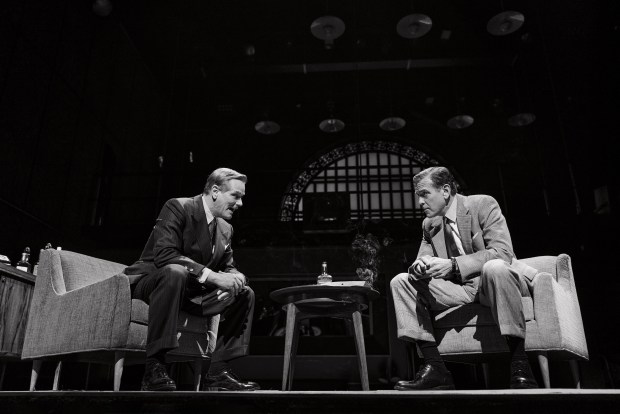No American theater professional has had a spring like David Cromer, the longtime Chicago theater director who opened two Broadway shows in New York in a matter of weeks, “Good Night, and Good Luck” starring George Clooney and based on the 2005 movie, and the musical “Dead Outlaw.”
Both have been successes. Cromer was nominated for a Tony Award for his work on “Dead Outlaw” and, last week, “Good Night, and Good Luck” became the first play in the history of Broadway to gross more than $4 million in a single week. On Monday, Cromer opens yet another show, “The Antiquities” at Chicago’s Goodman Theatre. Penned by Jordan Harrison and co-directed by Caitlin Sullivan, the Goodman production restages a futuristic show seen last year off-Broadway at Playwrights Horizons in New York.
Cromer flew in and out of Chicago briefly for technical rehearsals but sat down with his favorite Lou Malnati’s pizza for an interview at the Goodman. Our following conversation has been edited.
Q: How goes the spring?
The spring is very busy. I’m happy as a clam. I’m lucky.
Q: So many shows.
A: I would like to be conservative in my agreeing to things, but I don’t see that happening if opportunities are afforded to me. It’s just hard to say no to things you think you want to do. “Good Night, and Good Luck” was simply an opportunity I could not pass up, but even though George Clooney was in it, we still had to wait for a theater so we didn’t know the timing. We also didn’t know when “Dead Outlaw” was going to happen. But then, I also wanted still to do “The Antiquities.”
Q: Why?
A: It’s a play about, blah, blah, blah, the human condition.
Q: Like so many of them are.
A: Like so many of them are. But it has a brilliant, speculative sci-fi construct that I was really excited by. It reminded me of Kurt Vonnegut although it is totally original. We spent several years doing workshops during COVID. It is about things I care about. I am never good at talking about what those things are, but I think we finally came around to the idea that it is about how every generation thinks they lost something by being in the generation they are in. “We used to not be on our phones all the time.” They used to complain that comic books rotted people’s brains. So there has always been an attack on the present and a deification of the past on our way to saying that things are getting worse. Then there’s the idea that if technology comes to mean that we don’t die anymore, then that would also become something we felt we were missing: “We used to try to live more because we were going to die.”
Q: Big death-themed spring for you, what with “Dead Outlaw.”
A: We have to be more comfortable with death because we don’t have a choice. Valuing life is important but having a good relationship with death could be useful. Both shows are about that. The thing that keeps us striving is seeking to avoid death: seeking of pleasure, happiness, things that nurture us. Doing plays is part of that.
Q: Was “Good Night, and Good Luck” a life-changing artistic experience for you? Talk about a colossal canvas.
A: I loved having that amount of technology and resources and 25 actors. There were “yeses” to choices we wanted to make on that show that would not otherwise have happened. I don’t think I ever do specifically political theater, and I don’t think I have ever done a show about an important point in history since “Angels in America” in Chicago. So, yes. It was a brand new experience. I don’t imagine I ever will do a play in a theater that size again.

Q: There was a very bracing and shocking video of very timely media clips. Who came up with that? It had content that only occurred weeks ago.
A: George (Clooney) and Grant (Heslov). It had been written into the original screenplay. But they decided not to do it the last minute because it felt out of scale with the film they were doing and didn’t feel right. The focus of the film had more to do with how the media was changing. And the focus of this production changed more to how fascism was on the rise again.
Q: You did see a lot of changes in the use of video technology on Broadway this year.
A: Video used to be so strange in a show. I think it took a long time for people to figure out had to use it well. But let me say, in like 1985 at Wisdom Bridge Theatre, I went to see Robert Falls’ “Hamlet” and, at the end, Fortinbras came in with live video of the bloodied bodies. I remember being dazzled by that. And that was 43 years ago.
Q: With Clooney you were around a mega-celebrity for the first time, creatively. What was that like?
A: He made it very easy. I don’t know how well I handle things like that. I am always intimidated and I think there will be impatience with my flakiness, especially given how George has a million projects going all the time, things at every level. Artistically, he is incredible dry and subtle and does not like any broad stuff. He was always upping the ante on keeping it simple with me and making me feel like I was being very baroque and melodramatic. But he understands his place in show-business and takes it very seriously and goes out of his way to make people feel comfortable. Edward R. Murrow liked to be influential and famous, too. But he did feel like he was doing public service. I get emotional every time I read his words. The show certainly makes money but it also gives us words to remind us that we have been here before.
Q: What do you believe you added the most?
A: I wanted us to spend more time with the CBS reporters, to show people how the sausage was made. I also wanted those screens to come out because I felt people were going to come to the show to see George so we should make sure that they were really able to see George.
Q: And “Dead Outlaw”?
A: I didn’t think it was going to be that interesting a story at first, more of a “Ripley’s Believe it or Not.” But I also knew it was David (Yazbek) and Itamar (Moses), so I was smart enough to just keep my mouth shut and say yes to everything.
Q: What’s next?
A: I am doing a play called “Caroline” at MCC (in New York) by a Chicago writer, Preston Allen. I am doing some workshops of a musical adaptation of the movie, “Weekend.” And I am doing a second workshop this summer of “Fire and Rain,” the James Taylor musical, which Tracy (Letts) is writing. … He has had a script for a while. He has already done a rewrite.
Q: This is a biographical show?
A: No. It’s an original story. It rhymes a little bit with James Taylor’s life. It starts in 1970 and takes place in North Carolina for a little while, which is where he lived when he was young. It’s about these young people who are in a band together, and their families. It’s called “Fire and Rain” and has to do with finding out you aren’t going to see somebody again which is the hook of the song. Tracy and James spent about a year talking with each other and talking about music. James was very specific. He didn’t want the story of his life or of all his struggles. So it’s very much a Tracy Letts play with James Taylor songs.
There is a moment in the script when one of the characters becomes famous. But one of the things we have talked about is how there are many talented people who do not became famous. So maybe it could be more about, what is a life in art that does involve success and fame? Is that necessarily a tragedy? Are there not other ways to live your life than being successful and famous?
Q: No vacations coming?
A: I can have a vacation when I am dead.
“The Aniquities” is now in previews and runs through June 1 in the Goodman’s Owen Theatre, 170 N. Dearborn St.; 312-443-3800 and www.goodmantheatre.or
Chris Jones is a Tribune critic.
cjones5@chicagotribune.com



